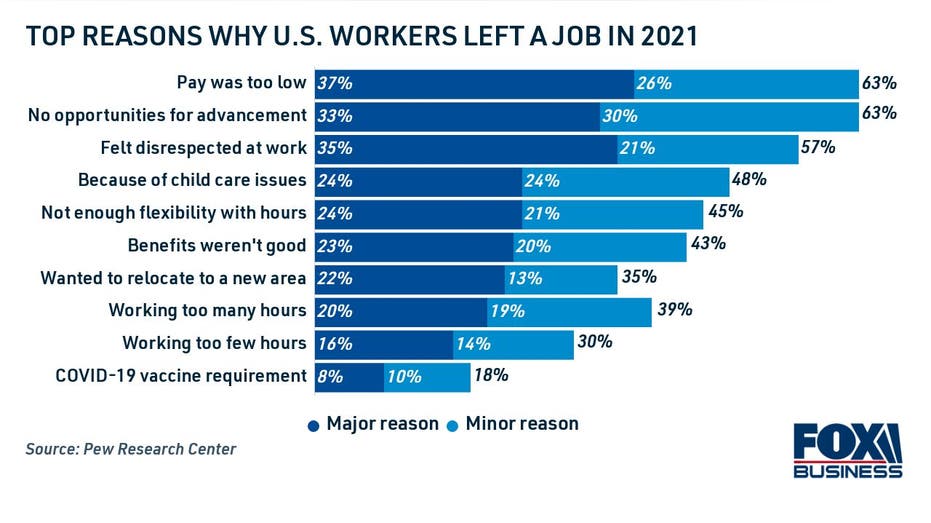Many American workers have been seeking higher-paying jobs to take advantage of national wage gains and offset the financial impact of record-high inflation. The national quit rate reached a record high in November 2021, per data from the Bureau of Labor Statistics (BLS), signaling a shift in the labor market known as the Great Resignation.
About a fifth (19%) of U.S. workers left a job in 2021, according to a new survey from Pew Research Center. The top reason why U.S. workers left a job last year was that their pay was too low — nearly two-thirds (63%) of respondents cited low pay as a reason for quitting. Furthermore, 37% said it was a major reason, and 26% said it was a contributing factor.

Former employees also felt that they had no opportunities for advancement (63%) and felt disrespected at work (57%). About half (48%) of workers left a job because of child care issues, while nearly a fifth (18%) cited COVID-19 vaccine requirements as a reason for quitting.
However, quitting isn't an option for some consumers who rely on a consistent monthly income to make ends meet and repay debts. If you're searching for ways to lower your monthly debt payments without leaving your current job, one option to consider is paying off high-interest credit cards with a personal loan. You can visit Credible to compare debt consolidation offers for free without impacting your credit score.
Young, low-income Americans were more likely to quit a job
About one in five workers (19%) quit a job at some point in 2021, but the resignation rate was much higher among certain segments of the population. Adults younger than 30 were the most likely group to have left their jobs, at 37%. In comparison, just 17% of workers ages 30-49 and 9% of those ages 50-64 quit a job last year.
Americans with low pay were also far more likely to have quit their job last year than those with higher incomes. About a quarter (24%) of lower-income adults quit a job in 2021, compared to 18% of middle-income adults and 11% of upper-income adults.
For many of these workers, their decision seems to have paid off in the form of better benefits, higher compensation, and added flexibility. Most (56%) employees who found a new job now have better pay, and about half (53%) said they have more opportunities for advancement like promotions.
Still, many workers who quit a job in 2021 have been unable to find a new position — about 22% don't work full-time or part-time. Even among workers who did find another job, a fifth (20%) said it was a difficult process.
Job seekers who are looking for ways to cut expenses while they search for gainful employment might consider credit card consolidation. It may be possible to reduce your monthly debt payments by paying off high-interest credit card balances with a fixed-rate personal loan. You can learn more about debt consolidation by visiting Credible.
College graduates were more likely to find a job with higher pay
Among workers who left their job last year, college graduates seem to be faring better in their new roles than those with less educational attainment.
Two-thirds (66%) of college-educated workers are now earning more money than they were in their old jobs, compared with 51% of workers who didn't graduate college. And 63% of college graduates now have more opportunities for advancement, versus 49% of those without a degree.
Although a college degree may pay off in the form of higher earnings, many graduates are burdened with the extra cost of student loan payments. Borrowers who have private student debt may consider refinancing to reduce their monthly payments while fixed rates are low. You can compare current student loan rates in the table below, and use Credible's student loan calculator to decide if refinancing is right for you.

